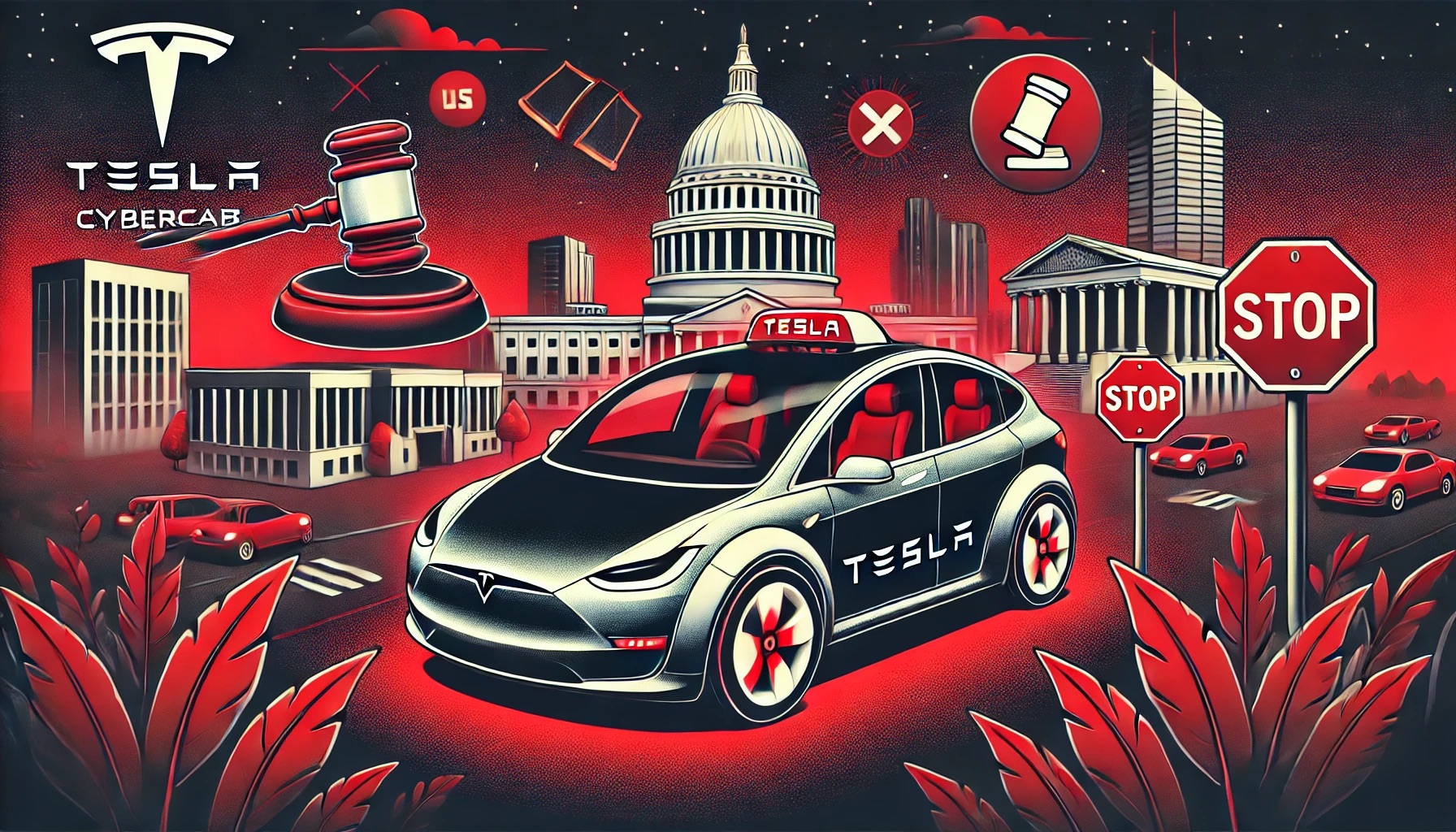Elon Musk showcased Tesla's futuristic Cybercab, aiming for mass production by 2027. However, strict U.S. laws governing autonomous vehicles may render mass production illegal, putting Musk's ambitious timeline in jeopardy.
Musk Unveils Cybercab and Robovan
At a glamorous event in Los Angeles last week, Elon Musk, CEO of Tesla, revealed his plans for a future where cars drive themselves. The Robovan, an autonomous bus, and the Cybercab, a self-driving taxi developed by Tesla, were unveiled at the event.
Musk claims that by 2027, the business intends to release a fleet of these autonomous vehicles; however, there are several challenges that Tesla must first resolve.
Full Self-Driving Tech Faces Crucial Refinement
According to Bloomberg, the first challenge will be for the business to perfect its Full Self-Driving tech, which it claims would be the foundation of the new Cybercab. The second will be to persuade Congress to reconsider its stance on the introduction of autonomous taxis.
Musk has grand plans to make the Cybercab a best-seller, but American lawmakers have imposed stringent regulations limiting the mass manufacture of autonomous vehicles:
“Unless Congress increases this limit, as several failed bills would have done, exemptions aren’t a viable route for a mass manufacturer,” said Bryant Walker Smith, a University of South Carolina law professor and autonomous vehicle expert.
Regulatory Hurdles Threaten Musk’s Ambitious Timeline
Regulatory hurdles were one of multiple issues Musk sidestepped during his much-anticipated unveiling of the robotaxi, billed as a pillar of the Tesla chief executive officer’s push into robotics and artificial intelligence.
NHTSA has long permitted manufacturers to deploy 2,500 vehicles per year under a granted exemption, a tiny total for a company that sold nearly half a million cars last quarter alone. Such a low number also contrasts with what Musk told investors last week, when he said Tesla would “make this vehicle in very-high volume.”
Congressional Limits Overshadow Cybercab Rollout
During his presentation at last week's We, Robot event, Musk, predictably, avoided discussing the limitations imposed by Congress. Additionally, Musk has been vague on how his business would transition from developing driver aid technologies to distributing fully autonomous vehicles.
Cybercab Production Delays Echo Previous Promises
While presenting the Cybercab, Musk made the ambiguous claim that production will begin in 2026 and that customers should begin receiving their orders by 2027.
Jalopnik notes, however, that he has been promising Tesla self-driving taxis for nearly a decade, has failed to release the long-awaited Tesla Roadster, and delayed the first Cybertruck delivery by many years.



 Ford and Geely Explore Strategic Manufacturing Partnership in Europe
Ford and Geely Explore Strategic Manufacturing Partnership in Europe  SpaceX Seeks FCC Approval for Massive Solar-Powered Satellite Network to Support AI Data Centers
SpaceX Seeks FCC Approval for Massive Solar-Powered Satellite Network to Support AI Data Centers  Prudential Financial Reports Higher Q4 Profit on Strong Underwriting and Investment Gains
Prudential Financial Reports Higher Q4 Profit on Strong Underwriting and Investment Gains  Anthropic Eyes $350 Billion Valuation as AI Funding and Share Sale Accelerate
Anthropic Eyes $350 Billion Valuation as AI Funding and Share Sale Accelerate  Alphabet’s Massive AI Spending Surge Signals Confidence in Google’s Growth Engine
Alphabet’s Massive AI Spending Surge Signals Confidence in Google’s Growth Engine  TSMC Eyes 3nm Chip Production in Japan with $17 Billion Kumamoto Investment
TSMC Eyes 3nm Chip Production in Japan with $17 Billion Kumamoto Investment  Trump Backs Nexstar–Tegna Merger Amid Shifting U.S. Media Landscape
Trump Backs Nexstar–Tegna Merger Amid Shifting U.S. Media Landscape  Oracle Plans $45–$50 Billion Funding Push in 2026 to Expand Cloud and AI Infrastructure
Oracle Plans $45–$50 Billion Funding Push in 2026 to Expand Cloud and AI Infrastructure  Toyota’s Surprise CEO Change Signals Strategic Shift Amid Global Auto Turmoil
Toyota’s Surprise CEO Change Signals Strategic Shift Amid Global Auto Turmoil  Amazon Stock Rebounds After Earnings as $200B Capex Plan Sparks AI Spending Debate
Amazon Stock Rebounds After Earnings as $200B Capex Plan Sparks AI Spending Debate  FDA Targets Hims & Hers Over $49 Weight-Loss Pill, Raising Legal and Safety Concerns
FDA Targets Hims & Hers Over $49 Weight-Loss Pill, Raising Legal and Safety Concerns  SoftBank and Intel Partner to Develop Next-Generation Memory Chips for AI Data Centers
SoftBank and Intel Partner to Develop Next-Generation Memory Chips for AI Data Centers  Once Upon a Farm Raises Nearly $198 Million in IPO, Valued at Over $724 Million
Once Upon a Farm Raises Nearly $198 Million in IPO, Valued at Over $724 Million  OpenAI Expands Enterprise AI Strategy With Major Hiring Push Ahead of New Business Offering
OpenAI Expands Enterprise AI Strategy With Major Hiring Push Ahead of New Business Offering  Baidu Approves $5 Billion Share Buyback and Plans First-Ever Dividend in 2026
Baidu Approves $5 Billion Share Buyback and Plans First-Ever Dividend in 2026 































